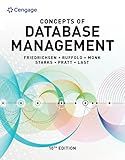Best Database Tools to Buy in February 2026

Database Systems: Design, Implementation, & Management



Database Systems: Design, Implementation, & Management



Database Systems: Design, Implementation, & Management



Concepts of Database Management (MindTap Course List)



Statistics: A Tool for Social Research and Data Analysis (MindTap Course List)



Bioinformatics for Beginners: Genes, Genomes, Molecular Evolution, Databases and Analytical Tools


To get the sum of rows in Oracle, you can use the SUM() function along with the GROUP BY clause. Here is an example:
- Consider we have a table named "sales" with two columns: "product" and "quantity".
- To find the sum of quantities for each product, you can use the following query:
SELECT product, SUM(quantity) FROM sales GROUP BY product;
This query will return a result set showing the product name along with the total sum of quantities for each product.
Note: The SUM() function is an aggregate function in Oracle that calculates the total sum of a specified column. The GROUP BY clause is used to group rows based on a column, and the SUM() function operates on each group separately.
How to calculate the sum of rows in Oracle?
To calculate the sum of rows in Oracle, you can use the SUM() function with the GROUP BY clause. Here's an example:
Let's say you have a table called "sales" with the following columns: "product_id", "quantity", and "price". To calculate the sum of the "quantity" column for each "product_id", you can use the following SQL query:
SELECT product_id, SUM(quantity) as total_quantity FROM sales GROUP BY product_id;
This query will group the rows based on the "product_id" column and calculate the sum of the "quantity" column for each group. The result will include two columns: "product_id" and "total_quantity" which represents the sum of "quantity" for each "product_id".
What is the effect of using DISTINCT in the SUM() function in Oracle?
When using the DISTINCT keyword with the SUM() function in Oracle, the effect is that it eliminates duplicate values before performing the summation. This means that it calculates the sum only for distinct values within the specified column.
For example, consider the following table:
| ID | Sales | |------|---------| | 1 | 100 | | 2 | 200 | | 3 | 100 | | 4 | 200 | | 5 | 100 |
If you use the SUM() function without DISTINCT:
SELECT SUM(Sales) FROM table_name;
The result would be 700, which is the sum of all the sales values in the table.
However, if you use the DISTINCT keyword with the SUM() function:
SELECT SUM(DISTINCT Sales) FROM table_name;
The result would be 300, which is the sum of only the distinct sales values (100 and 200). It eliminates duplicate values (100) before performing the summation.
So, the DISTINCT keyword in the SUM() function helps in getting the sum of distinct values and avoids counting duplicates in the calculation.
What is the role of the WITH clause in calculating the sum of rows in Oracle?
The WITH clause, also known as the common table expression (CTE), is not directly involved in calculating the sum of rows in Oracle.
The WITH clause is typically used to create a temporary, named result set, which can be referenced multiple times within the same SQL statement. It helps to simplify complex queries and improves code readability by providing a way to break down a complex query into smaller, more manageable parts.
To calculate the sum of rows in Oracle, you would typically use the GROUP BY clause in combination with the SUM function. The GROUP BY clause groups the rows based on one or more columns, and the SUM function calculates the sum of a specific column within each group.
